Remarks by President Emomali Rahmon Before the 76th Session of the United Nations General Assembly
Read also
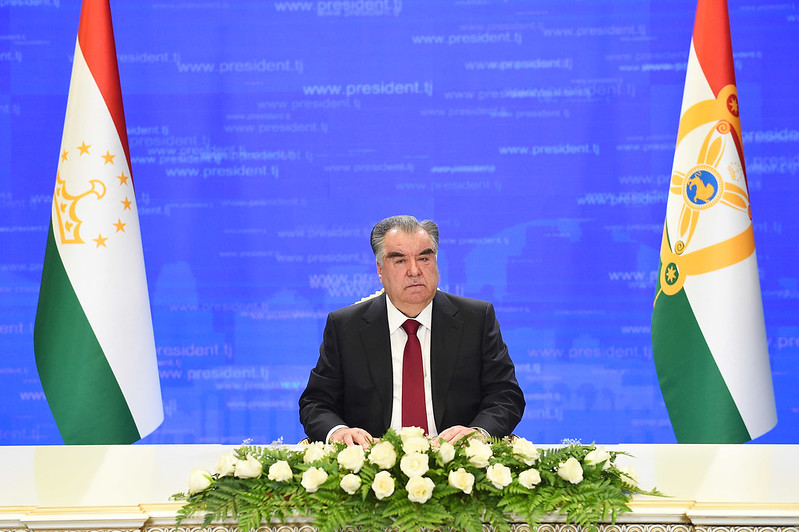
24.09.2021, Dushanbe city
Distinguished Mr. Chairman,
Excellency Secretary-General,
Ladies and gentlemen,
At the outset, I would like to convey my congratulations to the Chairman of this session of the UN General Assembly, Mr. Abdullah Shahid, on his election to this post.
Dear colleagues,
On September 9, the glorious people of Tajikistan celebrated a very historic and memorable event — the 30th anniversary of Tajikistan’s state independence.
In the initial years of our independence, our country was plunged into the tragic events of the imposed civil war, and went through difficult days.
Ending the war, bringing the fighting parties together, ensuring peace and stability, and concurrently restoring diplomatic relations and constructive cooperation with the countries of the world were among our top priorities.
Despite the existing difficulties, thanks to the policy of «open doors» and peace, we have managed to take a deserved position on the world stage and ensure the sustainable development of our country.
Dear colleagues,
The already unstable situation in the current world is further complicated by geopolitical and geoeconomic competition and the growing level of threats and dangers, as well as the unprecedented spread of infectious diseases.
This situation doubles the responsibility of states to pursue a far-sighted and coordinated policy to address the current challenges.
The role of international and regional organizations, especially the United Nations and its specialized agencies, is key to finding effective solutions to the problems of the current world.
Mr Chairman,
Recent developments in Afghanistan, linked to the political and humanitarian crisis and governance, pose a serious threat to regional security and stability.
The crisis situation in Afghanistan, which shares almost 1,400 km of border with Tajikistan, cannot leave the Government and the people of our country indifferent.
The rise to power of the Taliban, which is listed as a terrorist group by the United Nations Security Council, has further complicated the region’s already complex geopolitical process.
The Taliban’s failure to deliver on its earlier promises to form a comprehensive government with the broad participation of Afghan political and ethnic forces is a matter of serious concern.
Tajikistan strongly condemns all forms of lawlessness, murder, looting and oppression against the people of Afghanistan.
Unfortunately, human rights organizations have remained silent on the violation of the rights of other ethnic groups residing in Afghanistan and the freedoms of its citizens, especially women and children, and have not commented on the matter.
As in the case of Panjshir Province in Afghanistan, we are witnessing a tragic violation of international human rights.
The people of Panjshir have no access to food, other basic commodities, as well as humanitarian aid, and even the United Nations and the International Committee of the Red Cross are still unable to enter Panjshir to fulfill their humanitarian obligations.
The current situation is a humanitarian catastrophe.
The growing intensity of fights between the ethnic groups and tribes in Afghanistan is another factor further destabilizing the political and security situation in our neighboring country.
In view of this, the establishment of a comprehensive dialogue with the participation of all segments of Afghan society is one of the main preconditions for the establishment of lasting peace and stability in that country.
In this regard, along with other ethnic groups of this country, the Tajiks of Afghanistan, who comprise more than 46% of the population of this country, have the right to take their deserved pie in the public affairs.
Mr Chairman,
We will not interfere in the internal affairs of Afghanistan.
However, we believe that in order to properly address the political and security problems of the neighboring country, it is necessary to form a comprehensive government through elections based on the will of the people of this country with the engagement of all political groups and national and ethnic minorities.
Thus, in our view, it is necessary to determine the structure of government in that country through a referendum by taking into account the position of all citizens of the country.
The formation of any government without taking into account the interests of all the people of Afghanistan can lead to catastrophic consequences in this country.
During more than 40 years of war and instability, which the Afghan people are not to blame for, Afghanistan has become a geopolitical platform; and the world is well aware of the consequences of the horrible events of September 2001.
The suffering Afghanistan and its friendly and brotherly nation should not be dragged into the abyss of imposed bloody wars again.
In this regard, the international community should not remain indifferent to the fate of the peoples and nations living in Afghanistan and its neighbors.
Hence, they have a long way to go, full of military and humanitarian problems, which have arisen due to the reckless decision to withdraw foreign troops from this country.
As a close neighbor, we are always in favor of a comprehensive solution to the Afghan problem and the restoration of lasting peace and stability in this country, and we will continue to stand firm in this position.
In this regard, we call on the international community to take immediate and effective measures to stabilize the difficult political and security situation and ensure peace and stability in Afghanistan through peaceful means at the earliest possible.
Tajikistan has called on international organizations, in particular the United Nations and the International Committee of the Red Cross on several occasions, to provide immediate assistance to the Afghan people.
We believe that the United Nations should play a key role in advancing this process.
Dear colleagues,
The peaceful people of Afghanistan are faced with terror today.
We need to understand that this is not the fault of the Afghan people, but that it was organized from the outside and imposed on the Afghan people.
In this case, we are talking about the massacre of civilians, former members of the national security forces and civil servants of Afghanistan.
Various terrorist groups are actively using the unstable military and political situation in Afghanistan to strengthen their position.
We have witnessed the release of thousands of members of ISIS, al-Qaeda and other terrorist groups.
In other words, it is a matter of concern and regret that today Afghanistan is once again on the path to becoming a breeding ground for international terrorism.
Tajikistan, which, due to its geographical location, is at the forefront of countering current threats and challenges, such as terrorism, extremism, radicalization, drug trafficking and other transnational organized crime, will continue its efforts to prevent their further spread and believes that the support of the world community is vital in this process.
Dear colleagues,
Tajikistan is constantly making joint efforts with its partners and international organizations, in particular the relevant institutions of the United Nations, to ensure lasting peace and stability throughout the world.
Successful implementation of the National Strategy of the Republic of Tajikistan on Combating Terrorism and Extremism for 2016-2020 has created a favorable basis for the development and adoption of a new Strategy for Combating Terrorism and Extremism in Tajikistan for the next five years.
Countering the illicit trafficking of drugs, psychotropic substances and precursors, the proceeds of which are one of the main sources of funding for international terrorism, requires joint action and coordinated efforts by the international community.
The Republic of Tajikistan, which has gained considerable experience through the implementation of its National Strategy for Combating Drug Trafficking to 2020, also contributes to combating this phenomenon at the regional and international levels.
Taking into account modern methods and approaches to combat these phenomena, and in order to pursue an effective policy in this area, we have adopted our National Drugs Control Strategy for 2021-2030 in the first semester of this year.
Mr Chairman,
We, in Tajikistan, are well aware of the value of peace and the importance of its protection.
We are satisfied with the positive experience in our country’s cooperation with the United Nations in this regard.
Hence, Tajikistan has always supported the peacekeeping activities of the United Nations and will continue to make efforts to contribute to the restoration and maintenance of peace and stability in the conflict zones.
We intend to increase the number of our officers to contribute to this process in the future in cooperation with the United Nations Department of Peacekeeping Operations.
Moreover, in order to contribute to the implementation of the goals and objectives of the UN Security Council, to share the rich experience of Tajikistan in countering security threats and restore full peace and stability through negotiations, we decided to nominate our country for non-permanent membership of this Council for 2028-2029.
In this regard, we stand ready for cooperation with all UN member states and hope that they will support Tajikistan’s candidacy.
Dear colleagues,
The COVID-19 disease and its more dangerous waves remain a cause for concern along with the above-mentioned security threats and major problems.
This disease, which originally began as a health crisis, has led to a global economic crisis.
Having recognizing the importance of cooperation between countries in overcoming the negative socio-economic consequences of the pandemic, the Republic of Tajikistan welcomes the UN Comprehensive Responce to COVID-19 launched by the Secretary General.
We also welcome the efforts of various organizations, foundations and programs of the United Nations, including the World Health Organization, in providing vaccines against this disease, as well as immediate and long-term assistance to member states.
Economic and financial performance of countries and the negative consequences of COVID-19 will delay the timely implementation of the Sustainable Development Goals, especially in developing and least developed countries.
Therefore, recognizing the important role of the United Nations in the effective and timely implementation of these goals, we are confident that the Decade of Action to achieve Sustainable Development Goals (2020-2030) will facilitate to find effective ways to address global challenges, including climate change, poverty, gender inequality and funding.
Dear colleagues,
Climate change challenges are also a serious obstacle to achieving the Sustainable Development Goals in various countries, including Tajikistan.
Tajikistan with 93 percent of its territory covered by mountainous, is concerned, along with other countries in the region, about changes in the hydrological cycle leading to severe floods and droughts and causing a negative impact on water, energy and food security.
Unfortunately, our country loses hundreds of millions of dollars annually as a result of water-borne disasters, and in many cases, natural disasters cause human losses and destruct the vital infrastructure.
We are today on the eve of the 26th session of the United Nations Convention on Climate Change.
We believe that this meeting will significantly contribute to achieving the goals of the Paris Agreement and accelerating the efforts of the international community in the fight against climate change.
One of the serious consequences of this process is the melting of glaciers.
As a result of climate change and unprecedented warming, more than 1,000 of the 13,000 glaciers in Tajikistan’s mountains have completely melted.
According to the available statistics, the Fedchenko Glacier alone has shrunk to 11 square kilometers in recent decades in Tajikistan, and lost 2 cubic kilometers of ice.
This all is happening despite the fact that up to 60% of Central Asia’s water resources originate from Tajikistan’s glaciers.
Our country ranks 135th in the world in terms of carbon dioxide emissions and produces 96% of its electricity in hydropower plants.
As the leader of such a country, I have made concrete proposals at international conferences on several occasions to find solutions to the problems associated with climate change.
In this regard, as a member of the founding group of the World Water and Climate Coalition, I proposed at its first high-level meeting to declare the years of 2025 as the International Year for Preservation of Glaciers.
It is my firm belief that this initiative will help to attract more attention of the world community to the water and climate issues and the melting of glaciers.
The establishment of the International Fund for Glacier Preservation under the auspices of the United Nations is another step that could provide a basis for comprehensive research and effective solutions to this global problem.
Mr Chairman,
Tajikistan is recognized as an initiator and lead country and contributes to the process of promoting water and climate issues in the Global Development Agenda and submitting relevant UN resolutions on these issues.
The International Decade for Action «Water for Sustainable Development, 2018 — 2028» initiated by Tajikistan and declared by the United Nations, is under implementation currently.
The international community is looking forward to the United Nations Conference on the Comprehensive Medium-Term Review of this Decade, to be held in New York City in 2023.
Because in almost 50 years, this will be the second Special Conference of the United Nations on Water, which will once again prove the key role of water issues in the global development agenda and the achievement of the Sustainable Development Goals.
We are proud that Tajikistan, together with the Kingdom of the Netherlands are elected as co-chair of this important international forum.
In this regard, we have already begun preparations with our partners, including the Kingdom of the Netherlands and the United Nations Department for Economic and Social Affairs, and are taking steps to organize a comprehensive and high-level conference.
We would like to encourage all stakeholders to cooperate extensively in this process.
Let me recall that in 2022, our country will host the International High-Level Conference on the Review of the International Decade for Action «Water for Sustainable Development».
We believe that this forum will play an important role in the preparations for the 2023 Water Conference.
Taking this opportunity, I reaffirm my country’s readiness to advance water and climate issues at all levels, especially in cooperation with the United Nations.
I thank you for your attention.











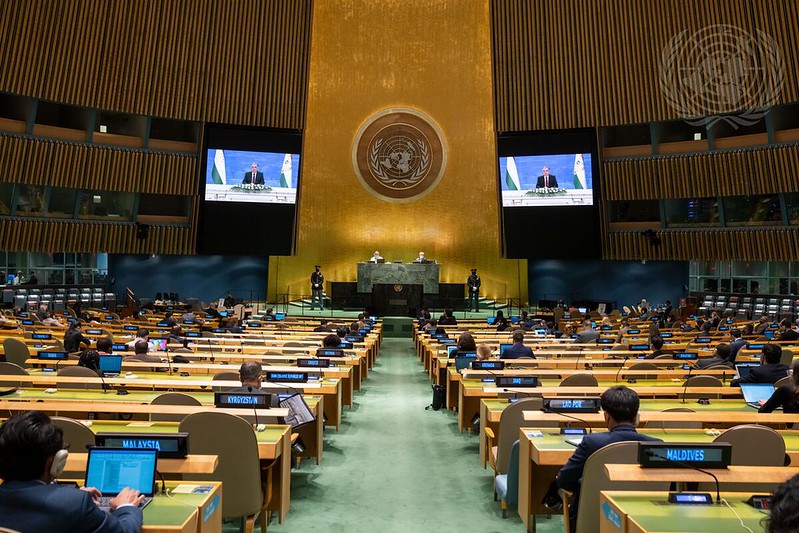
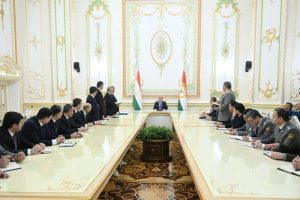 President Emomali Rahmon Makes Personnel Appointments
President Emomali Rahmon Makes Personnel Appointments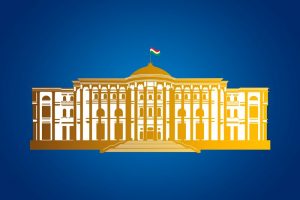 Congratulatory Message of His Excellency Emomali Rahmon, President of the Republic of Tajikistan, on the 33rd Anniversary of the Armed Forces
Congratulatory Message of His Excellency Emomali Rahmon, President of the Republic of Tajikistan, on the 33rd Anniversary of the Armed Forces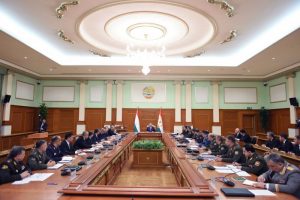 President Emomali Rahmon Holds Security Council meeting
President Emomali Rahmon Holds Security Council meeting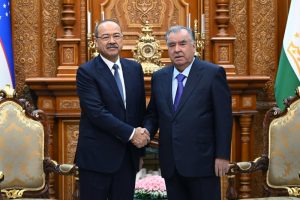 President Emomali Rahmon Receives the Prime Minister of the Republic of Uzbekistan Abdulla Aripov
President Emomali Rahmon Receives the Prime Minister of the Republic of Uzbekistan Abdulla Aripov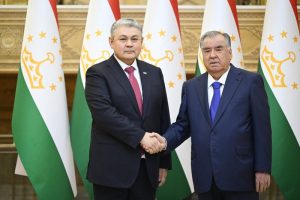 President Emomali Rahmon, Received the Minister of Foreign Affairs of the Republic of Kazakhstan
President Emomali Rahmon, Received the Minister of Foreign Affairs of the Republic of Kazakhstan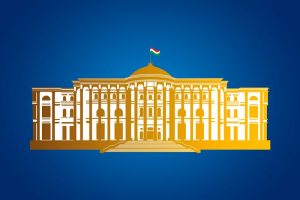 President Emomali Rahmon Enacts New Laws
President Emomali Rahmon Enacts New Laws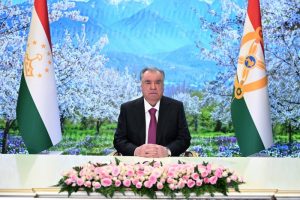 President Emomali Rahmon Sends Festive Greetings to President Xi for Chinese New Year
President Emomali Rahmon Sends Festive Greetings to President Xi for Chinese New Year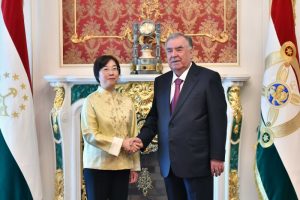 President Emomali Rahmon Receives AIIB President Zou Jiayi in Dushanbe
President Emomali Rahmon Receives AIIB President Zou Jiayi in Dushanbe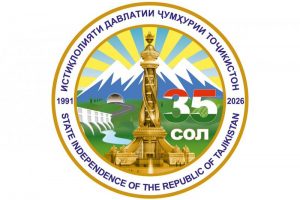 President Emomali Rahmon Approves Emblem for the 35th Anniversary of Tajikistan’s State Independence
President Emomali Rahmon Approves Emblem for the 35th Anniversary of Tajikistan’s State Independence














